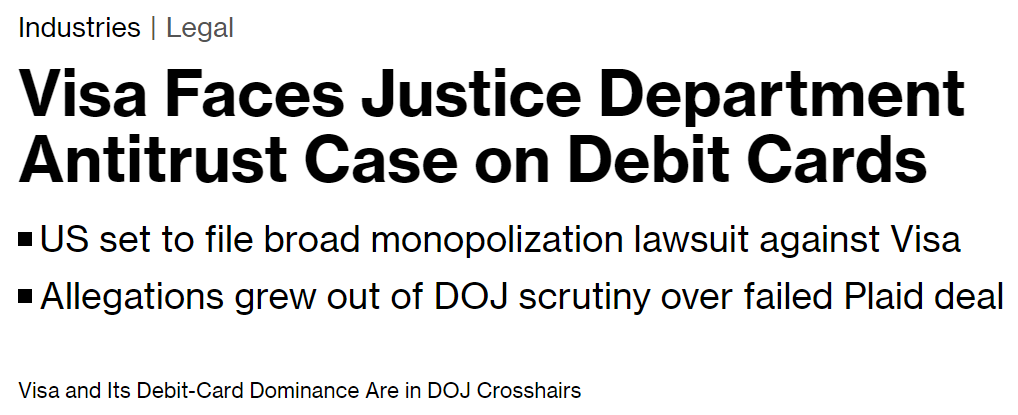How DOJ sues Visa's monopoly change your portfolio?
The U.S. Department of Justice (DOJ) plans to file an antitrust lawsuit against VISA.
The legal action, which will sue the payment technology company in federal court, is expected to start as soon as Tuesday. Antitrust regulators are poised to accuse $Visa(V)$ of engaging in behavior that prevents competitors from entering the debit card market.This includes entering into exclusivity contracts that impede the development of rival payment networks and preventing tech companies from entering the market, according to the report.
What does the DOJ charge?
The DOJ's statement says: We allege that VISA has illegally amassed power to charge fees far in excess of what it might charge in a competitive market.
Raising transaction fees through monopolization.VISA processes more than 60% of all debit card transactions in the U.S. Its large market share allows it to set high transaction fees and service standards, thereby squeezing smaller competitors;
It is difficult for new entrants to thrive.By building a complex ecosystem of consumers, banks, and merchants, VISA makes it difficult for new entrants to gain the necessary market share and customer data, and slows the pace of innovation across the payments industry;
Exclusivity agreements.VISA enters into exclusivity contracts with merchants and banks that require merchants to use only VISA's payment network.
Punitive Fees.VISA imposes punitive fees on merchants that choose to use other payment networks, thereby locking in transaction volumes and further strengthening its market position.At the same time, VISA offers financial incentives to entice potential competitors to partner with it.
Why Target VISA and Not Mastercard
The DOJ has actually been on VISA's radar for more than a day or two. in 2020, the DOJ filed a lawsuit against VISA that successfully blocked VISA's acquisition of fintech startup Plaid.
Over the past year, the DOJ has reportedly been targeting large fintech companies including VISA, $PayPal(PYPL)$ $Block(SQ)$ , and $stripe in an antitrust investigation.
And VISA has more than 60% of the debit card market in the U.S., much higher than $MasterCard(MA)$ and $American Express(AXP)$ .This market dominance gives VISA greater control over pricing and transaction fees, which has led to stronger regulatory concerns.
What is the purpose of targeting the payments industry?
In direct terms, payment companies are just intermediaries and do not create value directly.And the wool comes from the sheep, high transaction costs, will ultimately let merchants and consumers to bear.
From another perspective, high transaction costs also affect commodity prices to a certain extent, exacerbating inflation.
In recent years, the U.S. government has increased its regulation of large technology and financial companies, particularly in the area of antitrust.VISA, the largest debit card processing network, has naturally become a key target of focus.
How might it end up?
If the DOJ ultimately decides that VISA has engaged in monopolistic behavior, Huge fines, changes to improper competitive strategies, changes to the business model, and even a request for a spinoff could all happen.
Of course, this is not the first time that VISA, which has become a current mega-company, has faced an antitrust lawsuit, and its legal team will try to minimize the impact of the incident as much as possible.
The performance of the secondary market on September 24th actually reflected investors' views on the incident.The broader market overall traded still strong on that day and continued to reach record highs, but VISA went all the way down.

Disclaimer: Investing carries risk. This is not financial advice. The above content should not be regarded as an offer, recommendation, or solicitation on acquiring or disposing of any financial products, any associated discussions, comments, or posts by author or other users should not be considered as such either. It is solely for general information purpose only, which does not consider your own investment objectives, financial situations or needs. TTM assumes no responsibility or warranty for the accuracy and completeness of the information, investors should do their own research and may seek professional advice before investing.
- quiettt·2024-09-25This DOJ lawsuit against VISA could have significant consequences for the company.LikeReport
- j islandfund·2024-09-25thanks for sharingLikeReport

